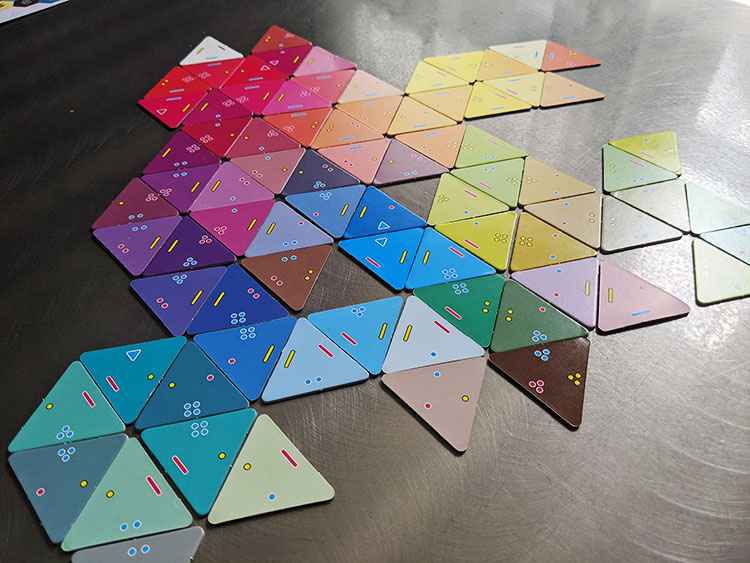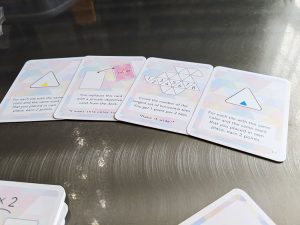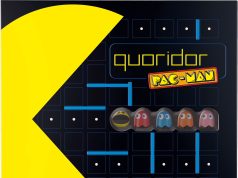On occasion, I fancy a game that has no theme. Removing the possibility of fitting a square-pegged theme into a round hole, an abstract game just presents itself as a function of play, plain and simple. The coagulation of rules and component manipulations dictates its ability to provide a compelling gameplay experience—a foundational rule for any coherent game design. Perhaps this is why CMYK! caught my eye.
CMYK!, published by Kujiradama and Big Cat Games from designer Nagisa Kujira, plays 2 to 5 players in about 15 minutes.
Gameplay Overview:
The rules and setup for CMYK! are fairly simple. Depending on the number of players, stacks of 12 tiles are placed at the table within everyone’s reach. Players are dealt a private objective card and one public objective card is placed on the table. These cards offer bonus points, but the way to earn the majority of them is by creating hexagons. The hexagons are created from the tiles publicly available to everyone. Each tile has a shape and color on each of its three sides. The caveat is that in order to place a tile into the blossoming hexagon, any adjacent tiles must match the shape and color found on that side. This usually isn’t too problematic, only more so when one is attempting to complete a hexagon and needing to find that perfect match for two sides.
Once all the tiles are gone, players total up their completed hexagons, subtracting points for any wild tiles which were used in a pinch. Whoever has the most points, wins. There are some additional ways to extend out the game, but this is CMYK! in a nutshell.

Game Experience:
After my first time playing this game, the feeling was reminiscent of Nine Tiles Panic from Oink Games. It has the pressure of time constraints while manically arranging components to reach peak score. As games start and finish within a quarter-hour, not doing one’s best only heightens the challenge for the next round. This presses it firmly into the filler category. It doesn’t take long to set up, the most time-consuming being counting and stacking the appropriate amount of tile piles. For that reason, along with the simplistic instruction, I found myself looking for opportunities to introduce it to others.

If aesthetics are of importance, there will be no shortage of a myriad of color schemes which players will create on the fly. Even when the color pinwheels don’t follow their colorful cadence, the symmetry of crafting triangles into hypnotic hexagons can be quite satisfying.
I did find the game could be slightly problematic for certain play settings. Ideally you have all the players close enough together to see the tiles, which are unfortunately on the smaller size, and more unfortunately, contain smaller shapes not easily discerned from a distance. This wasn’t difficult in a two-player setting, but a crowded table it might cause issues. It’s also worth noting that if your dexterity tends towards the lower side like mine, toppling over stacks will occur. The rules actually address this, pausing play to properly set things back up, and in most friendly settings, this would have already been assumed. Because the tiles are a touch smaller, this may be an infrequent occurrence to be aware of.

One item of note was the objective cards, both public and private. Certain ones felt effortless to attempt, while others, such as those that give more points if a player gathered tiles with a particular shape (all private cards have a variation on this requirement) were almost pointless in my mind due to the frenetic nature in which players are grabbing tiles. It felt as though they were awarding points that I happened upon instead of planned and strived toward. Moreover, there is a limitation on the number of points one could receive from a private objective that doesn’t hinder the public ones. As there are more than twice the public cards by comparison of the private options, it feels as though these secret objectives were nearly an afterthought by design. I would have liked to see more private objective options as well as the removal of the point limitations.

Final Thoughts:
CMYK! offers itself as an artful abstract with feather touch instructions, serving as a pleasing appetizer or pallet cleanser for game night. What it lacks in strategic hardiness, it makes up for with color-theory inspired, visually appealing aesthetics and engaging gameplay. Punchier objectives could definitely have helped this one to stand out. Yet CYMK! still manages to entertain without overcomplicating.
Final Score: 3.5 Stars – An entertaining, abstract filler that stumbles slightly with limited bonus point opportunities
Hits:
• Visually appealing
• Simple instruction
• Capable of occupying the filler category in one’s collection
• High player engagement
Misses:
• Strategically lacking in a genre where it is somewhat expected
• Private objective cards are hindered and lacking
























